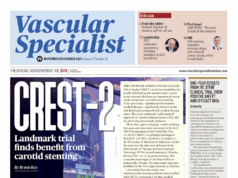 A prospective study has demonstrated that carotid intervention can improve mood in depressed patients with advanced carotid disease, in addition to enabling cognitive improvements irrespective of baseline depression.
A prospective study has demonstrated that carotid intervention can improve mood in depressed patients with advanced carotid disease, in addition to enabling cognitive improvements irrespective of baseline depression.
These findings were presented during the Plenary Session 1: William J. von Liebig Forum at VAM 2023 by Bahaa Succar, MD, a postdoctoral research fellow at the University of Arizona in Tucson.
Speaking to VS@VAM, Succar said: “This study provides valuable information regarding the use of carotid interventions, particularly for patients with asymptomatic carotid artery stenosis. Since stroke and mortality rates are relatively low for carotid interventions and best medical therapy, mood and cognitive assessments could offer an additional perspective to help clinicians tailor the treatment approach when counselling a patient.”
Outlining the backdrop to their work, the researchers note that the impact carotid interventions may have on neurocognitive function in patients with advanced carotid atherosclerosis has not yet been fully elucidated. In addition, little is currently known about the impact carotid interventions can have on mood.
As such, they set out to investigate this phenomenon in a “well-defined cohort of patients”, prospectively recruiting a total of 158 people undergoing carotid revascularization. Screening for depression was performed preoperatively, and at one, six and 12 months post-intervention using the long form of the geriatric depression scale (GDS) questionnaire. The cohort was divided into ‘depressed’ and ‘non-depressed’ based on preoperative GDS scores >9 and ≤9, respectively. Patients also received other neuropsychometric tests to assess memory and executive function concurrently at the designated timepoints—with scores being adjusted against age and education to generate scaled comparisons.
Succar reported the following results at VAM 2023: At baseline, depression (GDS >9) was observed in 49 subjects (31%), whereas 109 (69%) were not depressed (GDS score ≤9), and the average preoperative GDS scores were 15 and 4 in the depressed and non-depressed groups, respectively. A “significant improvement” in average GDS scores was observed within the depressed group at one month (13), six months (13.2) and one year (11.6) post-intervention compared to preoperatively, whereas the non-depressed group had similar postoperative GDS scores at all timepoints compared to baseline.
“Improvements in mood are only among those who had baseline depression,” the researchers conclude. “Further studies with larger sample sizes are warranted to investigate the association between depression, carotid disease, and carotid intervention.”












